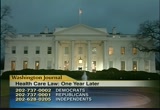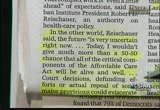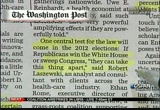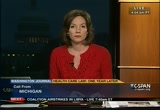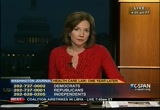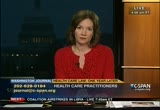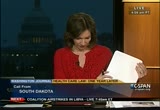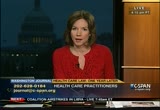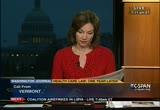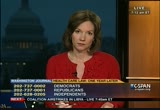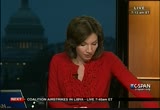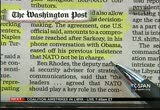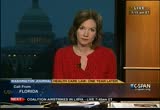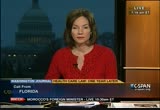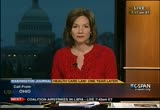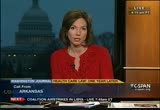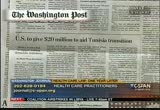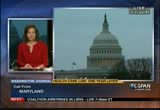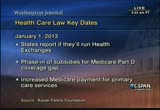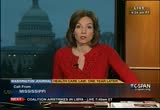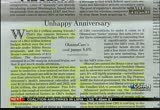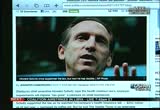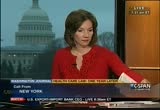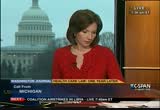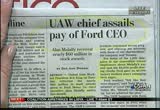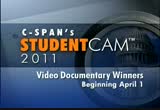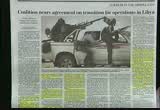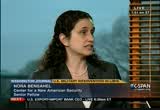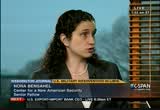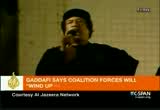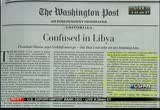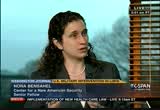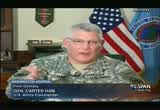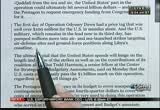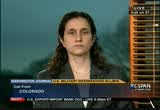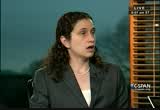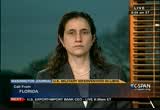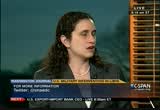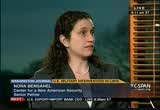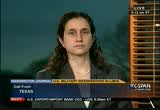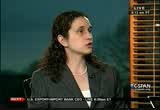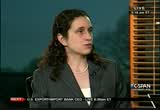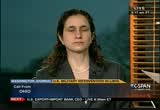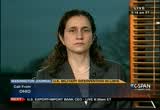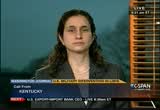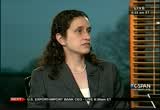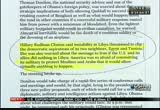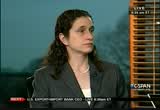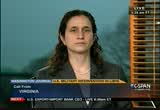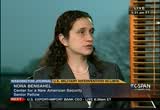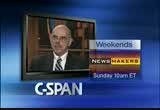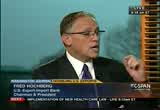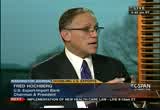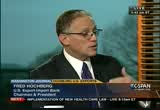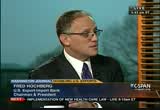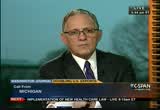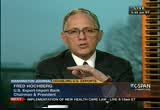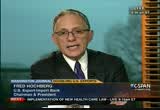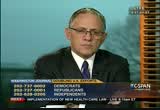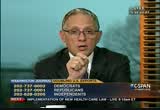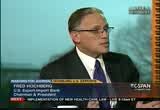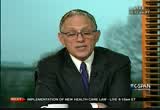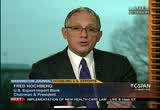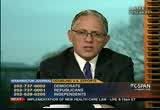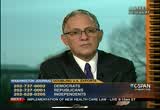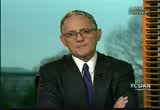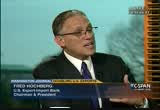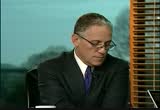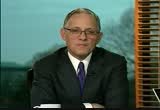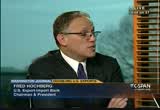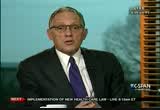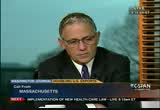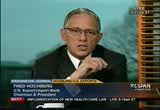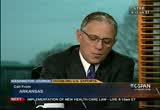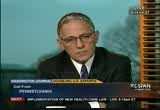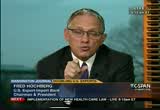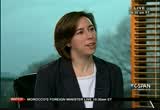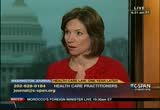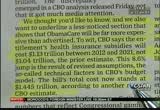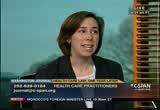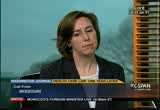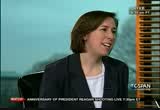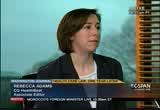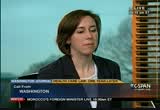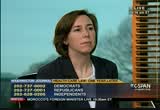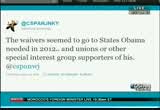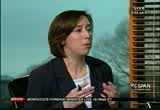tv Washington Journal CSPAN March 23, 2011 7:00am-10:00am EDT
7:00 am
new american security. we will talk with the u.s. import export bank on president obama's trip to latin america and what it means for u.s. trade. after that, we will discuss the implementation of the health care law. ♪ host: as president obama cut his latin america trip short, and returns to washington, the washington post reports that key nato allies have tentatively agreed to take the lead role. but none have officially signed on. other news out of the middle east -- the yemen president
7:01 am
pledging to step down when your early has not satisfied opponents. help from saudi arabia is likely to be rejected. we will keep you updated throughout today's "washington journal." the nation's health-care law turned 1 years old today. we have a separate line set aside for health care .ractitioner i the new health care law -- it says, a loose federation of left-leaning groups have gathered to peddle the virtues of health care reform.
7:02 am
it is like we have to world. the article says that in other words, the future is very uncertain right now. i would not give more than a 50- 50 chance that all the critical components of the affordable care act will be alive and well. nearly 12,500 americans have joined hybrid's schools ever created for people who were attracted by a insurance companies. enrollment is 3% of government forecasts.
7:03 am
7:04 am
if focus to weight management, diabetes, and hypertension. the main point i want to make, maybe we have heard a lot, is that no matter what kind of modifications we may, including the health care act, we really must focus on the kind of preventable disorders that are related to lifestyle. expensive periods of time during the day, we are not exercising that much less but we're sitting seven hours or eight hours a day with increased risk of death from all causes, not to from vendinge ekat machines, fast food restaurants, so we can modify ,his system as much as we ligke but until the country addresses
7:05 am
this life style epidemic, i am afraid we will not generate the cost savings promised in this legislation. host: can i ask you about the actual health care law? have you seen changes? has it impacted you? caller: not yet. i am fortunate in my practice with the paper makes that is well to do. i do not have free time to improve school lunch programs, which is how i feel like i am balanced spiritually. i admit i like a lot of the components of the system, excess -- especially pre-existing conditions and allowing kids to be on the insurance longer when they're going to school. it does not impacted me significantly other than electronic records and things we see coming down the pike. host: as a hospital already started that aspect of it?
7:06 am
caller: we started the strategy for getting into place. host: how much will it cost? caller: i do not know. even though i have a libertarian orientation, it is more information at the point of purchase. i guess i could argue like to see all, but some kind of information there, it seems to have an effect in the local area where it is done in new york. i have seen people literally change orders going through and traveling through new york and see what the calories are. they had no clue it had that much in there. host: tom, i want to show you and our viewers -- today what goes into effect because of the law. grants to states for health insurance exchanges begin today. restaurant chains and vending machines must disclose nutritional contents as well. that is what you're talking
7:07 am
about. host: i am a contradiction. i am of libertarian philosophy, but there is no problem giving informations. you're not telling people what or what not to eat. we have to educate people but sometimes takes a ph.d. to understand eight facts label. they are overwhelming. straight forward information at that time of purchase is the main way of behavior modification. no one will look after they have ignored -- ordered. and most will not go to a website. it is out there and there is a lot of lip service from the food industry, but unless it is at the point of purchase, there is no chance it will make a difference. host: 04 will let you go, you do not know the cost for your hospital to go to electronic medical records.
7:08 am
do you know a time line? caller: we're trying to get up to speed within the next two years. different practices are layered on line. host: we will hear from tom, a democrat in sioux falls. caller: i have three examples why the healthcare law is a good deal so far. for me, anyway. i am 60 years old. i just get the paperwork to join a high risk pool here in south dakota. the state already did have a high risk pool, but it would've been $900 a month. this new federal high risk pools will be $350 a month. the second example is, my brother in law just had a liver transplant. he had reached at the cap on his medical insurance, but now there
7:09 am
is no cap. he was okayed for a liver transplant. the third example, the wife just got on medicare part d and all of this. this new done the whole thing will help her. she is on expensive medication and it will help her in the doughnut hole. i wish people would sit down and study this a little bit. i looked it up on the computer. some of the things you may not agree with, but i would say 80% of it will be helpful for the lower income people of this country, and people would not look it -- listen to the right wing extremists. host: let me ask you about the prescription drugs. your wife to started with medicare. caller: she just part of february 1, but she is on expensive medication. host: this year there is a 50%
7:10 am
discount for the prescription drugs. what is our total cost right now, if you do not mind telling us? caller: it just guarded, but the insulin is $600 a month alone. host: so this will be a big help. caller: definitely. people should just learn more about it instead of condemning it. host: you said that you would enter a high risk pools. i am curious why. caller: i have a pre-existing condition and i am 60 years old. i have a bad heart. basically the insurance companies laugh at me, total rejection. host: but billy r., vt., richard is an independent. caller: our state has just joined the exchange and allow our legislature to seriously consider a single payer. within the next week for to come
7:11 am
up for months will be informally on the road to single payer -- within the next week or two, vt. will formally be on the road to single prayer. it is crushing the play the health insurance premiums for our employees. you go north to canada, and we see businesses that are not involving in the pain that heavy premium because it is spread out among the whole population. host: about small business owners, sim graves, the chairman of the small business committee in the house, has a piece in the "washington times." small business employers --
7:12 am
what is your reaction? caller: apples and oranges. when we are talking about single payer, we are taking the requirement all of small business and putting it into the general public. as we fight -- pay for it fire and police. i do not pay for police in my small business or a large business. it is a shared community responsibility. in terms of businesses stepping to the plate, if you do not ensure your people, then you have a competitive in bandages over people that do. all of that is doing is leveling the playing field. otherwise it is a race to the bottom and no one will insure their people and makes the
7:13 am
situation worse. host: we will keep talking with these -- with you about this. i want to update you on libya. many papers reporting this morning that the president made phone calls to key nato allies to make an agreement about who takes over next. here is the "washington post." obama called the prime minister on monday evening, and --
7:14 am
7:15 am
charlene is a republican from orlando, florida. we are talking about the health care law one year later. about twom excited kids that are in college, up to the age of 26, i can continue to carry them because i encourage my kids to continue their education beyond a bachelor level. i have one daughter that has done that. as she continues her education, there is a time when i would have had to have covered her insurance policy was not in medical school. that is the one thing that helped.
7:16 am
another son when it happened to him, i was paying over $4 a month. insurance for him while carrying the insurance that we carry at home. but i really want to make this point, i am required by law to carry insurance on my car whether i want to cannot. i am required to carry insurance on my home whether i want to or not. ford -- do not tell me that if i'm an -- i and required to be carry insurance. host: a democrat is next. caller: i like to thank the president for giving us a health care program that is supplied by the taxpayer. this is the first time in the history of united states where american taxpayer dollars are spent on their health care needs. we have supplied the health care needs of those in the federal government, the state
7:17 am
government, the county government, and the city government, those in health care, and the postal system, those in education, those on the police force, and those that give this fire protection that we need. but this is the first time in the history of the united states where our health care needs, the people, who pay the taxes, are receiving something for their money. as long as we were supplying the needs for the health care people in all of those aspects of life, they were completely happy because we were supplying their needs. host: an independent in pennsylvania, your thoughts. caller: i like to say, i am glad that obama got the health care passed. i want to tell you something -- i am 52 years old and i've that heart problems. i could not get insurance. all the things that is wrong
7:18 am
with you, i doubt people -- people should watch the movie called "the rainmaker." it tells the truth. no matter what it does, you have that for years. host: sam is a republican from hot springs, arkansas. you are on the air. caller: i am calling -- i work for the telephones communications company, and i had insurance. my son is in college. i found that this year because of all, as health care bill -- because of obama's health care bill, that i cannot provide him dental and vision. i could not pay extra out of my
7:19 am
own pocket and get it through my answer is because of this health care bill. host: why is that? caller: because the insurance companies did not give me an explanation. they said that is the way that it is. host: is your son -- he is not in college? caller: he is in college, second year. host: and it is limited as to what kind of coverage you can give? caller: 04 of the health-care law, the insurance company covered him until he got out of college and i could provide him with a vision in denton -- in toronto. he is still on my health care and i paid extra for vision and didn't go, because my son needs glasses, and he needs teeth, his rambunctious and he bumped into them.
7:20 am
i am opposed for the government doing -- what we call government these days, doing anything to us. it is way out of control. it is beyond comprehension, the amount of debt that the federal government is then, and they keep piling it on like the party will never end. host: another headline at of the middle east. this is the "washington post." we will go to nicole in dayton, ohio. we lost in the cold. kerrey, a republican baltimore. you're next. caller: good morning and thank you for c-span. i do not know why i was celebrating. on my own personal experience, i have a spinal injury. they're telling me now that i can i get the pre-existing
7:21 am
insurance plan, the new plan, unless i do not have in the insurance company coverage for six months. how is that going to help me if i cannot work and i do not have any money? to your caller is celebrating the doughnut hole, if it was so good, why don't they just eliminated? the insurance companies are afraid they're going to lose their jobs because of these new requirements that the insurance companies pay 85% of their money on services. to the participants. i do not know why we are celebrating. and what is there to celebrate about taking $500 billion out of medicare? this is absurd. host: so more key dates in the health-care law. by top of first, they will be
7:22 am
increase support under medicaid it establishes of medicare independent payment advisor board. it will recommend cuts to medicare. by january 1, 2012, they will be new annual fees on the pharmaceutical industry. more fraud protection for medicare and medicaid and test chip, and reduce rebates for medicare advantage plans. if you take a look by january 1, 2013, more key dates for you. states will report it they have run health exchanges. they wore a port on those. this phase in of subsidies for medicare part d coverage gaps, which the colleges talked about. and the tax on medical devices. we will go to wayne, an independent in west virginia. caller: i work for small business that employs about 60 people. because of this law, my employer
7:23 am
cut his employees down to 25 and he got rid of anyone who made over the $40,000 limit so that he could get a tax break from the government through this health care system. that is my comment. host: we will go to the next caller. caller: a comment to the lady who said something about the postal workers. lady, i've got news to you. we pay high premiums and also the postal service is self funded. there is no taxpayer -- taxpayers do not contribute to the postal service. they are self funded. and we pay high premiums. also, to the people watching, to you realize that in 2012, your employer's premiums that he pays for your insurance will be
7:24 am
taxed. you will pay taxes on those premiums. but say you paid $500 a month for your premium? you will be paying taxes on an extra $6,000 by year. that is a tax increase. someone will have to pay for all of these, all of this free care that some people will receive from this bill. host: we read earlier the chairman of the house small business committee, a republican emissary, he has a piece in the "washington times," about how this hurts small businesses. this is from "usa today," defending the bill. small businesses often struggle to stay afloat, let alone provide employee health insurance.
7:26 am
7:27 am
way. also my daughter, who is disabled. it has been doing a tremendous job for me. it is something that anyone who is elderly or younker for whatever should taking. and be quiet and quit trying to create chaos about the plan before they even use it. and most of the people are not intelligent enough to even know the benefits of it and even when they get them, they are listening to republicans that are so negative. host: specifically how did the health care law impact that situation? caller: it helped her with her copiague going down, the price that she pays for the insurance, plus the medication and everything has gone down. host: linda is a republican from orlando, florida.
7:28 am
caller: first of all, i believe the ceo or the on the project owner of starbucks has come out against the obamacare because of the negative impact it will have on small business. i hope he can do a little research and report more about that. i just heard this morning. host: we saw that story yesterday. i will look it up. go ahead, linda. caller: i have not heard a single person mentioned this and i think it is important. the democrats often criticize republicans as being cold hearted because many of us want this repealed. but it does not matter if you believe that none of the benefits matter, when you believe it is unconstitutional. no matter how good all of these
7:29 am
benefits and advantages could become a if it is unconstitutional, then it should not be. people really need to look at that, if it is not constitutional. then it has to go and it has to be -- i believe in health reform, absolutely. but we need to come up with something that is constitutional. host: linda, if republicans try to get rid of the healthcare law altogether, would you agree to that are which you like to see instead them try to make changes to what exists? caller: i think we just need to start over. it is flawed at its core. the individual mandate is the big piece that is unconstitutional. without the mandate, this current bill cannot stand. i think they need to take the pieces of it that all of these colors this morning have mentioned that are very good,
7:30 am
and i am sure their families are getting benefits from it. i think we need to take those pieces that are working, and start over. host: she mentioned the secret to the starbucks ceo. the political picked up the interview. here it is. requirements will impose too big up pressure on small businesses. he supported the law as it watches companies health-care tab now. but he told in an interview that his word about what happens when it takes full effect in 2014. you can go to politico.com to read the entire story. caller: good morning. i have been in the industry for 30 years. health care premiums for group
7:31 am
health coverage through your employer, those premiums go up every year automatically with or without health care reform. i will call him president obama instead of obamacare, because i respect him as president and i do not agree with all of his policies. but the health-care overhaul is needed, it was needed, and there will not be some tweaks to make it even better. but i guarantee you that with or without it, the premiums would continue to skyrocket. less ppo providers, now they are deductible with the copays rising every years. i pay the claims so i know. i work in the industry. host: what you do in the industry? are you a nurse? caller: no, i am a group health
7:32 am
care person who examines the claims. host: why do insurance companies keep raising the premium every year before the health care law? caller: because that is what happens. the providers require higher pay. it is just something that happens. host: from your experience over this debate, over quality care versus quantity care, what you say? caller: i think the quality of the care is getting better and better. the health-care overhaul that president obama has brought about will insure that. host: other headlines for you. here is the "chicago tribune." teachers -- $40 billion pigeonholed.
7:33 am
also on public employee pension this morning, here is the "wall street journal." public employees rush to in fact -- to retire. in wisconsin, where lawmakers voted in mid march 2 in worker'' collective bargaining -- from the democratic line, florida, what you think about the health care law? caller: i think it is a good thing. i agree with what the last caller had to say. you can pretty much tell the people that are calling and that are negative about it, listening to rush limbaugh, glenn beck and
7:34 am
fox news. wake up, america. host: what do you listen to? caller: i watched free-speech tv. "democracy now", thom hartmann, and c-span. host: from the republican line, brenda, what do you think? caller: how was just hired by a local company. this year when we had to fill out our new insurance premiums, mine tripled in cost. i am on social security. this has impacted us a lot. i think we are having to take care of others that do not have insurance. it makes it very hard on someone on social security and have your insurance premiums tripled. host: denise is a health-care
7:35 am
provider in michigan. you are up next. caller: if you set aside the constitutionality of a lot and the feasibility of it costing for the country to be of the pay for it, which they cannot pay for medicare and medicaid now, it really is an issue. i am a health-care administrator and a registered nurse. refunds for medicare, medicaid, and insurance companies, and i can tell you it is far more difficult to get the government, medicare and medicaid, to pay for services. medicaid is continued about 30 considered a third rate type of coverage. if the white house and the administration is looking at covering everyone, and that being a humanitarian thing, the issue is the coverage that you actually get is a very poor quality. medicaid covers very minimal
7:36 am
services to the patient. i really think that this health care law is wrong headed. it needs to be stopped. host: before you go, talk about how medicaid is limited. caller: for example, in a nursing home, if you are covered under medicare or a private payer insurance, it is generally a reimbursement of about $300 a day. medicaid, it is not even $200 a day at times. clearly what the provider has to do is look at the resources and taper back in order to cover people. most everyone in this country who does not have health insurance is still covered. they can go to a hospital and receive services. over 80% of the people in this country are happy with their health care coverage. this is completely wrong headed.
7:37 am
you might be covering everybody, but the quality of what you are covering is poor. that is why this health-care law -- hopefully we pray to god that it is found unconstitutional. host: we are taking your calls and giving your thoughts. i want to show you an interview that secretary of state hillary clinton gave yesterday with diane sawyer. she was asked when and how and who would take over the mission in libya. here is what she said. >> it will be one week on saturday. >> whether it is saturday or not depends on the evaluation. our military commanders along with our allies and partners, i hope that it is sooner instead of later. >> it might even be this weekend? >> it is moving well from our assessment. we do a call every day -- >> greater than would be nato?
7:38 am
7:39 am
on the lake, washington -- barbara, you are a democrat. caller: i have already seeing benefits for my family. my son has a congenital heart defect and he is 22. he is in college, his last quarter. after this, he will be able to get health care. we can count on that and we do not have to worry about that. also with my case, i had an accident last week and might there be money ran out. i think i had $2,000 that i could use. i called about the balance that i still love. i found that the my insurance company through my union, the only reason my family has health insurance, my husband's carpenters union, i can doubt that this year i'm allowed to have 30 visits. it is not the money cap now.
7:40 am
president obama charis, that is how i like to say, -- president obama cares, that is how i like to say. we all the need to take some personal responsibility. all the other industrial countries have health care. why don't we take a pay data their playbook and figure out how they do it? host: the tear from a republican, shirley, in lexington, kentucky. caller: i am a first-time caller. i have worked all my life. i am 55 years old. i pay my own health insurance. over the last few years and the debate over obamacare, my insurance has gone up three times.
7:41 am
it has gotten so high that i cannot now pay it. now i among the group of uninsured in the united states of america. and it does not feel good. i keep saying, where you sign up for obamacare? people saying it is so good, where is it? it did not include the hard- working people that have to pay their own insurance. it included the elderly, which i am glad. and the young in the whatever, but what about the middle? we worked hard and now we have nothing. can i even go to the doctor? host: would you be eligible for medicaid at some point? caller: and 55. is that 10 more years? host: i am not sure about medicare, but medicaid will be expanded to include more people. i was wondering if you had looked it that? caller: where you get that
7:42 am
information? democratic headquarters? host: that is according to the papers this morning. i just read from "usa today," coming down the road to the plan is to expand medicaid so that more people, lower income people can then get health insurance. caller: so one a couple of years, i can get that. host: i do not know. it depends on your income level. caller: that is down the road. host: the democratic line, go ahead. caller: back in the 1990's, supplies would have a cost rate four times the year. the cost of medical insurance,
7:43 am
part of that cost is what you call it, aspirin and all of that, and no one cares that the costs were so great. it was hitting the working class, and my mother was 89 last year. they operated on her for her problems. she died in three weeks, and the doctors said, her quality of life was going to be horrible. they did all of this, what was that?
7:44 am
host: before we in this conversation, a few more headlines. ron johnson, he writes about his opposition to the health-care law in the "wall street journal." here is the politico. also, the story in the "washington post," the united autoworkers president on tuesday criticized the nearly $60 million in stock awards given to ford motor company chief executive allen molly earlier this month. usa today has a story about the situation in japan growing and have an impact here in the united states. we will talk about exports and imports and how this plays into japan later on in the program. before our last phone call, i want to show you what colonel
7:45 am
gaddafi had to say late yesterday evening about the situation in libya. >> all the muslim armies have to take part in this battle against the crusaders. their protest all over the world to help you come in asia, and africa, in america, in europe. they are people against their own leaders. we will been -- we will win, we will be victorious, we will not surrender. host: an independent in north carolina, your the last phone call. what do you think? caller: thank god for c-span and. i am from south carolina, and only heard it once, our leaders met behind closed doors, which is illegal. i keep hearing about going to cut, going to cut. i walked into my nearby pharmacy and they didn't know and i did not know that my medicaid had
7:46 am
been cut. and they were not -- i'm a diabetic with kidney failure, but i could not get my insulin pills or my cholesterol pills. because my slots a gun. i had 12 medications and i can only get seven. so i am doing without food to get medicine. host: nancy, we will leave it there. we will talk about doubling u.s. exports with the chairman of the u.s. export-import bank, but will first turn our attention to libya and talk about military strategy there. we will be right back. ♪
7:47 am
>> the c-span video library is even more valuable for following congress. house and senate committees are being archived in one place -- the c-span video library. find out more, read our blog, and watch what you want when you want. >> beginning april 1 in throughout the month, we will feature the winners of this year's studentcam competition. nearly 1500 students admitted on that theme "washington, d.c. through lenses,"focusing on an issue that helped them understand the role of the federal government. meet this kid is that created them. stream all of the videos online at studentcam.org. every weekend, experience american history on c-span3
7:48 am
starting saturdays. it is 48 hours of people and events telling the american story. here first-person accounts from people who shape modern america. best known history writer from the past decade, and travel to important battle fields that shape the character the 150th anniversary of the civil war. visit college classrooms across the nation as professors delve into america's past during lectures in history. joint curators and historians behind the scenes at museum exhibits. and focusing on american presidents, policies, and legacies, as told through historic speeches and insights from administration officials and experts. c-span3, all weekend, every weekend. get our complete schedules online and find that how to get to the mailed to you. >> "washington journal" continues. host: nora bensahel, a senior
7:49 am
fellow at the center for the new american security, where she works on national security. i want to begin the headline that we started with this morning -- "the washington post." it appears that after conversations with the turkish prime minister by president obama on monday night, that they have backstopped their opposition of this being led by nato. it was like the french president sarkozy is going to be in agreement with having this led by nato. what is your reaction to that? guest: the military arrangements are going to be fairly clear. i think it enables nato's command-and-control structure to run the military parts of the operation. what is in the process of being decided is political control over that. in regular nato operations it
7:50 am
would be the north atlantic council, but one of the things that the french president has proposed is overseeing the political aspect and giving command in order to the military command by a committee of those participating in the operation. that gives turkey some cover. they do not want to be seen as a nato-led operation, and also the alliance can bring in some of the other countries who are not nato members into the political oversight of the mission. that is tricky to do. it establishes an ad hoc way a pattern of cooperation as the native council does. there may be some drawbacks associated with that political oversight. the agreement being talked about will be used -- using the nato command structure. host: we will talk more about the details. but in this article, is is that nothing is official. no one is signed the dotted line on this tentative agreement.
7:51 am
it could be announced as early as today. can you talk more about nato command center, all of that? militarily, what does that mean? guest: nato has been a military alliance since 1949. it has staff and officers assigned to that as their permanent position. they come from the national military. that is the commanding control structures used an overseas operation in afghanistan, for example, today. the advantage of using that structure is that is in place, it is tested, it is known. they are great difficulties setting up at hauck our arrangements. the command headquarters is located in belgium, about an hour outside of brussels. it is not quite the equivalent of the pentagon. in the war against iraq, the
7:52 am
u.s. war was committed from a headquarters in florida. they have a communications established with the commanders in the region in on the ground. host: what does it mean for the united states? guest: the and that is this is trying to hand off responsibility for the mission as quickly as possible. they wanted to do the things that only the united states could do, provide rapid command- and-control structure to get the operation going rapidly and effectively. and then to use the u.s. military firepower to destroy and dismantle gaddafi's command- and-control systems and particularly his surface to air missile capability. that is very important because no one -- everyone wants to minimize the danger to pilots enforcing the no-fly zone, and taking out those missile sites becomes very important to enable that.
7:53 am
but that is the initial phase. that is starting to wind down if you look at the number of targets, the number of sites already it, i think this operation has been designed so that the u.s. could do the thing that the unit -- the u.s. can uniquely to come up bring massive amounts of firepower in the beginning, and then pave the way for the countries to advocated strongly and diplomatically for the un resolution to come in and then sustain a no-fly zone. host: this piece written in the "washington post," it lists the deployment status, the military assets deployed to libya. only the united states was capable of doing what it has been doing since saturday. why is that? guest: the u.s. military is more advanced capabilities than most of our allies and partners, even france. there are some capabilities, but
7:54 am
in order to take down that surface-to-air missile threat quickly and effectively and in as short a time as possible, the united states is the only country that has the capability. host: we showed our burly retreated -- we showed our viewers earlier colonel gaddafi saying that we're going to be victorious. i am here, i am here, we're going to be victorious. guest: it is understandable for him to do. the outcome here is very unclear. the no-fly zone is in effect and is expanding across the country. perhaps more slowly than some of the city's held by rebels would like, but it is slowly expanding from the eastern part of the country to the west. it is not at all clear what happens once -- once it is expanded in the transition happens. the obama administration has made it clear distinction between what it is doing
7:55 am
militarily and diplomatic policies of regime change in libya. president obama said that military means will not be used to pursue that diplomatic objective, and that other tools of u.s. farm policy will be used. in practice, it is a confusing message to send and makes it unclear what happens after that initial wave of attacks is over. host: of the " washington post" editorial this morning. financial and arms embargoes are not likely to a force him out. an appeal to the collaborators to throw him out have been undermined by public predictions
7:56 am
7:57 am
guest: the most obvious are financial, using sanctions to freeze the assets of key individuals and organizations in the country. the u.s. security council or resolution explicitly addressed that, identifies people and organizations, but the u.s. is doing that bilaterally and on its own ends well. that is an open question. they do in some circumstances. it is not clear the extent to which they will work here. the u.s. had sanctions for libya for many years. it had to do with the shootdown -- the explosion of the plan over lockerbie. those were lifted recently. they have not reduced -- produced regime changeover that time. it is not clear whether the conditions are fundamentally different enough. host: let's go to the phone calls. we can talk later about the history of u.s.-libyan relations. callers joining us on the democratic line.
7:58 am
carl, turn your television down. santa monica, you are a republican. caller: thank you for c-span. what i think is that the comments coming from the president are a bit premature. i want to find a would you and your guests have to say about it. to withdraw within days, i think, is premature to say. when you have like khaddafi on television now, still speaking with you have him in power 40 years after the turmoil he was causing -- i think we should just stay our ground, get the job done, and stay calm. host: talk about days versus weeks. guest: they're talking about
7:59 am
transition in the responsibility, especially the political responsibility, to these different entities or states. it is not talking about a complete withdrawal of forces over libya and ending the no-fly zone. that is important. it is talking about reducing the u.s. role, having done the initial parts and turning over responsibility to the countries, particularly france and great britain, who pushed very hard diplomatically to get it established in the first place. host: we've seen general ham operating out of germany. is he leading this right now? it would no longer be him in charge? guest: yes. if it does use debt nato- integrated command structure, there would be a designated commander in charge of it. host: we will go to lake
8:00 am
charles, louisiana. go ahead. caller: good morning. i am an ex-vietnam veteran. a pack in the 1970's, we used to go to all of these ports in the mediterranean. we were always going into these countries that did not like us. they call that diplomacy, you know? these people threw rocks at us back in the 1970's. i knew back then that we were going to be the policemen of the world because we were showing our flag and these people hated us. we did it anyway. host: are we being perceived as the policemen of the world? guest: there is no love for
8:01 am
muammar gaddafi and a lot of outrage about how he is treating his citizens. on the other hand, anything that resembles western intervention is also a deep problem. -to the attitudes are conflicted in many ways. the longer this goes on without a final resolution, i think the pressure in the arab world may move more towards imposing intervention and then in terms of supporting the efforts to protect libyan civilians. host: this transition between who politically is in charge -- that is not going to sway -- will it have an impact on how the arab world is perceiving this? guest: i am not sure the people make a great distinction between
8:02 am
a u.s.-allied intervention and an intervention where france and great britain are playing a prominent role. it may make a difference for some. host: the general briefed reporters from his command post in germany on monday, speaking about how complex is to do this military transition. take a listen. >> there are some very complex, technical things that have to occur, particularly in the management, command and control of the air campaign to make sure that we have no destruction whatsoever in the ongoing operation, two, that we put none of our crews air risk as we go through this transition, so there are some
8:03 am
complex tasks that have to occur. but i would also say that we are ready to begin the process immediately as soon as that headquarters is identified. host: what is your reaction? guest: there are certainly technical issues. that is one of the advantages on building on the nato command structure. there is a standing body that is used to making these arrangements. host: what will be the u.s. role once this transition takes place? guest: i think that remains to be seen. what president obama said yesterday is he does not seem u.s. plans being heavily involved in patrolling the no- fly zone or being involved in maintaining it. exactly how many u.s. air plans -- does that mean zero? does that mean to sound?
8:04 am
i think that remains to be seen. host: let me read a little bit of this. this could ultimately hit several billions of dollars. the first day had a price tag well over $100 million in the u.s. missiles alone. this was written yesterday. do you have anything to add to that? guest: in the scale of the budget, they are not that large compared to the $750 billion budget of the defense department. this is being funded out of the normal budget for operations. the reason was the number is so
8:05 am
high on the first day is because tomahawk missiles are so expensive. all of the normal maintenance stuff that goes on in an operation. i think that will be the final driver of what the costs are. host: the defense department typically buys 200 tomahawk missiles a year. it will ultimately need to boost plans for pretreatment rates to refill its stockpiles. that totaled $112 million to $168 million for the first offense but the u.s. which lost about 112th long-range tomahawk cruise missiles. let's go to colorado. nancy is on the republican line. go ahead.
8:06 am
caller: i have a couple of comments and a question. i see the hypocrisy going on compared to president bush. all kinds of questions were asked of him, and nothing is going on with obama. they do not ask him in the tough questions. the press does not care. but they do make comments about how much it will cost and when we are going to get out. these things are going to come up finally as they did with president bush. president bush went through the congress and throughout the united nations before he went to iraq. host: lets talk about the constitutional question that has
8:07 am
been raised. as you look at the war powers from 1973, the president can send combat troops in battle for 60 days without a declaration of war by congress or a specific congressional mandate. does this mean ground troops? is there a distinction there? guest: that does not mean necessarily ground troops. it is the act of war in general. there have been major u.s. wars such as the 2003 iraq war which had congressional authorization, but most military actions have not. congress is recourse is very blunt. all they can do is cut off funding for military operations.
8:08 am
that is something they can do if they are frustrated that no request has come into the vote on the conflict. host: that is what one congressman has tried to do. let's go to bobbie, an independent from washington, d.c. good morning. caller: what is it that the political establishment -- one minute they are saying obama is not taking leadership. when he does exert a force, he does not have congress' approval and so forth and so forth. a what is it that they want this gentleman to do? everyone is talking about the cost of the work. how come nobody is talking about the cost of afghanistan? host: karl is on our democratic
8:09 am
line. guest: i want to pose a scenario. the united states says at the libyan situation is a mediterranean problem and it should be up to the mediterranean powers to pursue it. between the italians, the french, and the spanish, they have five aircraft carriers. i cannot believe that libya could stand up to that. why is it necessary for the united states to be participating in this effort when our european allies should be handling it? secondarily, if they are not able to handle it, why are they allies? guest: at the beginning, i think the u.s. policy has been designed deliberately to get these countries to take the bulk of the military action with the u.s. doing the things our front
8:10 am
that it was uniquely capable of doing. the comment about the criticism of president obama is a fair. at the beginning of this crisis, there were huge criticisms of letting civilians be slaughtered and not taking military action particularly when france and the united kingdom were pushing for a resolution. now there is a lot of military criticism about whether we should be there at all. some of this is part of the national debate on issues, but it is notable that there is a shift in the commentary about it. host: the new show our viewers this headline. -- let me show our viewers this headline. what does this do to the
8:11 am
coalition that we are seeing conflict between the two russian leaders about whether or not this is an appropriate action in libya? then you see the defense secretary calling for a cease- fire. guest: once the u.n. resolution was passed -- they did not vote for it but they did not veto it. once they chose to let it happen but without political support, their influence over what happens is very low. host: which will go to fort worth, texas. good morning. caller: they want to say he is attacking his civilians. his civilians did not like a peaceful demonstration. they rioted and took up arms. the people on of muammar gaddafi's side are people, too.
8:12 am
nobody is looking to that. there was somebody that was willing to work. where are the diplomats? where are all of the people that obama said he would put his hand out to? that is not europe's oil. that is lydia's oil. there is a time when the guests have to go home. host: what is your reaction? guest: he try to make a clear distinction between civilians who are not involved in military action and those rebels who are taking action against libyan security forces. in practice, especially if you are piloting a cockpit, that is a clear distinction to make. in principle, it has been
8:13 am
established that the libyan people taking up arms, not just picking up a machine gun for self protection but those who are engaging with real military capabilities, our real targets for security forces. host: he has made the distinction between working with opposition forces, that they are not doing that. guest: he said they are not providing what is known as their support, helping to facilitate ground movement. host: let's listen to his own words about this issue of the air strikes and how they are not being coordinated with rebel forces. >> our mission is to protect civilians from attack by the regime ground forces. our mission is to not support any opposition forces. while we have reports from people who are reported to be in
8:14 am
the opposition, there is no official communication or formal communication with those in this so-called opposition that are opposing the regime's ground forces. host: we will go to johnnie in massachusetts, the independent line. you are on the air with nora bensahel. go ahead. caller: thank you for taking my call. i agree with the gentleman that was just on. if anyone from this country believe that we took up arms against our government, that they would not shoot us down, you'd better believe they would shoot us down. the trouble is we want to control the middle east and we are taking country after country after country over now. we have bases in saudi arabia and in iraq, afghanistan, and
8:15 am
pakistan. we have one in israel that people do not know of. until the american people wake up and see that we want to take for o --middle ea that is the only reason. wal-mart gaddafi is trying to protect himself -- muammar qaddafi is trying to protect himself. host: johnny mentioned being shot down. here is a headline from usa today. do you know the specifics of this? was it shot down? guest: what i read in the paper is there was a mechanical problem, that it was not shot down. host: this is an e-mail from a viewer. this person wants to know what the social policies have been of muammar gaddafi.
8:16 am
guest: it is hard to talk about a social policy from any areas in the middle east. what it dictators generally do is provide benefits to their friends and allies, particularly those that support them, and they take away things from those that do not. he does have an erratic streak of how he behaves internationally. there may be some eroticism of how he is distributing patronage threw out his country. host: a democrat from ohio, you are next. caller: i want to address a previous caller who said bush had gone to the u.n. and had gotten their permission. he did not get their permission. she also said that -- in fact,
8:17 am
bush took out the international atomic energy agency inspectors out of iraq and the resolution. it was pathetic that they voted for it. that resolution actually said exhaust all other means before invading iraq. i am amazed while i listened to msnbc and cnn the use of the "slaughter" and "massacre" in regard to libya. i have heard from your guest. i have heard many other people, chris matthews, and many other hosts actually used those terms. the massacre happened in iraq. we are not counting the dead and injured in iraq on your program
8:18 am
and other programs. americans do not want to look at that. i am alarmed by the use of the word "massacre" and "slaughter" on many programs. libya did not attack anyone. believe we are going in there and protecting civilians. if they were going in to protect civilians, we have many nations to attack. i wish we would address that issue, and the use of these words. also, what is the end game? what is the goal? who is in line to take charge? host: we will leave it there guest: i think the fear is there would be a massacre in the city of benghazi, that the forces were going to level the city.
8:19 am
one of the things i have been hearing is you see a lot of comparisons to the massacre in bosnia and 1995 where 8000 men and boys were killed in a single day's effort. there have been comparisons, the european leaders warning that benghazi was going to be another one. postcode this article in the financial times has the headline? -- host: this article in the financial times has this headlined -- below that are a couple of headlines to show you. below that is a question and answer about who is who in the opposition. who is going to take over?
8:20 am
guest: is a great question. we do not know. libya is a tribal society. the rebels are not organized as a political force in any means. if khaddafi is opposed or killed, it is not clear what political authority would succeed him. there are concerns that it would evolve into a tribal civil war or conflict. host: i want to go to the caller's question about what is the end came was. guest: is a great question. what the u.s. has done is to buy some time to protect as many civilians as possible. what the ultimate political outcome of this i think is very unclear. i think there is a lot that will shape up in the course of the next days. it may take longer if muammar
8:21 am
gaddafi proves to be resilient. i think there are a lot of unanswered questions right now about how this will evolve. host: louisville, kentucky, you are on the air. caller: i support the military 1/2%. -- 100%. there seems to be when this all happened, obama -- the first people that they ordered to come out of the country was shell and bp employees. those were the first people that he wanted out of the country, and he got them out of there for political reasons to make it not an oil issue. so they do not blow up the refineries and stuff. that was the main thing that they were worried about, to get them out first. now they are saying about
8:22 am
slaughtering innocent people and stuff. what about the people, the leader there, surrounding themselves with. he has mustard gas. that is a proven fact. he has mustard gas. host: what sort of reports have you read that talk about his arsenal? what does he have? guest: he has a pretty extensive military apparatus they invest a lot of money into a regime protection because they are always on the verge of being concerned about losing power. i have read a report that they have mustard gas. that is why i say a lot of things are unclear because we are in the early days of what is happening. there is a lot of strategic interaction and that will be happening.
8:23 am
then the coalition responding in time. there are a lot of dynamics still to play out. host: let's go back to how the decision was made in the impact of it. and the clinton was asked about this -- hillary clinton was asked about this last night. >> we have been told repeatedly that you were decisive in this. it did you persuade president obama? were you the voice that turned around the opponents? >> that is absolutely, i think, part of a story line that needs to be corrected soon and decisively. there was a broad debate and discussion within the administration.
8:24 am
>> was secretary gates opposed? >> i think it was a very thoughtful process. >> you are not going to characterize yourself? >> it was a decision that was made and the decision speaks for itself. host: the discussions were written about in this piece. nora bensahel, can you comment on that and th? guest: i think there were a number of influential voices in this debate. two important ones were susan rice and samantha power, in
8:25 am
national security staff member in the administration. a both were very influential in the decisions in bosnia and the clinton administration. they have written a tremendous amount on avoiding genocide and the importance of doing that. some involved had very strong views. host: we are talking to nora bensahel from the center for a new american security. we are talking about the u.s. and coalition strategies and libya. let's go to pittsburgh. caller: good morning. i would like to make a few points. i trusted bill clinton. he agreed with bush. i think he persuaded congress and bush and turned it into a political issue.
8:26 am
we are always hoping these other countries. do you see what is going on in the east? they are killing each other. i think the best thing we can do is get out of these countries, bring our troops home, and protect our borders. this is another blood for oil that bush did. the only country we should be defending over there is israel. not these other countries when we get out of there, they will destroy each other and we will not have to worry about it. host: we read in the papers just today a piece of looking at the history of libya. before muammar qaddafi came in, the new york times said you could hardly call it a country, that it was broken up into tribes and had a very semi- nomadic population.
8:27 am
in the there is a number middle east whose borders were drawn in that period of decolonization. those borders were designed to cut across tribal lines to try to weaken them and reduce their powers so they could beat managed as colonies. that is true with a number of states in the middle east. host: many say if he were to leave a could turn into is situation like somalia. guest: at the troubled nature of it -- somalia has been without any central government for more than two decades now. i do not know if that is the right comparison. there are countries where strongman leaves power and a strong conflict follows. host: a piece in the wall street journal today, how the name of
8:28 am
8:29 am
he would not look at her directly. so she left. his own the prime minister told her [unintelligible] this is her own the prime minister, saying it about the u.n. ambassador. libya is a british construct. basically, banding together three nations. for 300 years, it was turkish colonies. there are three distinct tribes
8:30 am
in this country. it is quite easy to have three different nations afterwards. let these guys have their own or a field. host: where are you from originally? caller: east africa. host: are you involved in the government? caller: i have observed many of these failed states. [unintelligible] host: is there a politically realistic way to -- are you arguing for it to be divided among opposition leaders and the control that way? guestcaller: these places go bak
8:31 am
many centuries. [unintelligible] host: nora bensahel. guest: i agree with what the caller said, that there are different groupings and history makes it very complicated. i think it is premature to talk about what the ultimate outcome is going to be. whether it will hold together under someone else's control. there are a lot of dynamics to play out. opening the lines backup raises questions about who should have power and who should not. host: an update on the situation in libya, nato warships
8:32 am
patrolling off the coast to enforce u.n. arms embargo has begun. out of yemen this morning, the parliament has approved a request to impose an emergency law for 30 days, the latest sign that the president plans to cling to power, demanding his ouster. next to that, the financial times has a piece saying that saudi plans to abandon the leader. nora bensahel, thank you so much for talking to our viewers about the military strategy in libya. we are going to switch topics. coming up next, doubling u.s. exports with the chairman of the u.s. export-import bank. >> more reaction on the situation in libya. newt gingrich tells nbc that president obama's interventions
8:33 am
are a badly run operation without a clear goal. adding that the reliance on humanitarian intervention could get the united states mired in intervention in all sorts of places. he is believed to be considering a run for the republican presidential nomination in 2012. general david petraeus speaking at the military thing take in london said a foreign troops are on course to complete their security role by the end of 2014 but progress could be reversed. he went on to tell broadcasters there will be tough fighting ahead. minister saysnt the spring could end if the transitions in egypt and tunisia do not lead to real democracy. he plans to talk to hillary clinton later today but will first address the gathering at the brookings institution.
8:34 am
those are some of the latest headlines on c-span radio. >> you are watching c-span, bringing you politics and public affairs every morning. weekdays, watched live coverage of the u.s. house. also, supreme court oral arguments. on the weekends, you can see our signature interview programs. you can also watch our programming and the time at c- span.org, and it is all searchable at our c-span video library. every weekend, experience american history on the c-span3 starting on saturdays at 8:00
8:35 am
a.m. eastern. here first-person accounts from people who have shaped modern america. the country's best known history writers of the past decade. learn about key figures in the defense. every weekend, visit college classrooms across the nation as professors delve into america's past. and the presidency, focusing on policies and legacies as told through speeches and insights from administration officials and experts. on c-span3, all weekend, every weekend. tatar complete schedule online. -- get our complete schedules online. >> "washington journal" continues. host: fred hochberg is the
8:36 am
chairman of the u.s. export- import bank. he just returned last night talking about the administration's efforts to double u.s. exports. he made that initiative a year ago? guest: 2009. host: at that point, he said the wanted to double u.s. exports in five years. the deficit is up from $40 billion in december. we are bringing in goods and services to the tune of $214 billion. this is a piece written in the washington times this morning.
8:38 am
achieving the goal of doubling exports over any time. will not promote the general recovery unless it produces a net export expansion, thereby reducing the trade deficit. what is your reaction? guest: i think this handling is overdone. what we have to do is increase exports of goods, services, and of small businesses. we have a lot of policies in place to increase exports. we import a lot of clothes and consumer electronics. we also import a lot of components that go into our exports. we need policies to push exports as much as possible. we are trying to become less oil will land. and lot of the exports are hydrocarbons, fossil fuels.
8:39 am
we are trying to make our homes more efficient. we need to do a number of things to reduce imports. the real push has to be with exports. you are not going to stop buying clothes made in china or consumer electronics. host: but do you see a connection between exports and u.s. jobs? guest: there is a huge connection. we are a very -- we require 85% of the content to be u.s.-made or u.s. produced. we create 7400 jobs for every billion dollars that we export. we were started in 1934 by fdr. the realization that spending overseas is inherently riskier
8:40 am
and harder to do. how do you collect on that? how do you make a loan to a customer in brazil or india? the bank was established by fdr in 1934. there are about 80 export-import banks around the country to help their manufacturers selling goods overseas. we provide financing for buyers. we can help provide a government guaranteed loan, working with the bank, so they can purchase the loan over a 10-year period. if you need money to buy inventory or equipment so you can ship goods overseas, we will work with your local bank, do a guarantee so your bank will be able to back it by 90%, and then
8:41 am
you can get a loan. i have a customer in florida who sells surgical sutures. one of his big customers is egypt. he makes a great product, delivers quality and value, and we guarantee the $300 owed to him from cairo is guaranteed by us host: how often do they not pay? guest: all write-offs last year were 1.5%. host: do you try to enforce -- guest: we do a better job of enforcing then he could do in in forcing. people do not like to default on us. we have a far better track record of collecting overseas than the individual might have
8:42 am
overseas. that is one of the reasons why we step in. we do a credit check on the companies. we have to make sure there are good character differences. host: you called that florida manufacturer your client. guest: he pays a premium on insurance. those premiums fully pay all of our expenses, all of our loan losses, all of of our administrative losses, and on top of that, we have to generate a profit. host: so you are not funded by taxpayers? guest: we are not funded by taxpayers. host: how many people work for the u.s. export-import bank? guest: 400. we have a few regional offices around the country. host: how many large businesses
8:43 am
do you work with? guest: 85% of the work that we do is for small companies. last year, we did $5 billion -- we did $5 billion in loans. host: you are the conduit for outsourcing jobs. how do you respond to that? guest: the money that we lend is jobs created here to sell goods and services overseas. host: what about importing? guest: we import in name only. when the bank was started in the 1930's, would help export capital goods. from developing countries, purchasing their finished products. that ended early on. we are only doing exporting. host: the phone lines are lighting up. john is on the republican line
8:44 am
from detroit. go ahead. caller: good morning. correct me if i am wrong, but you made the connection between importing oil and production of electricity. that is the first thing i wanted to clarify it. i do not believe we are producing electricity using oil or imported energy. if i am wrong, correct me. the other thing i would like for you to delve into the boat it is the reagan years. i sat there looking at reagan standing on principle, allowing toyotas and honda vehicles to pour into this country. i remember buicks -- i am characters in this, also in a buick onto the shores of japan. it would fund various ways of stopping that the wicked from
8:45 am
landing. apparently, they will love the buick in japan. if you could clarify those two things, have a great day, both of you. host: hang on aligned. i want to come back to you. guest: thank you for the question. one of the things is we still import a lot of energy. primarily for automobiles. one of the ways that we as a country begin to import less is through better energy policy because if we are more energy efficient, automobiles, using less power, just in terms of our energy mix, it is one of the things that is driving imports. i was trying to make that point.
8:46 am
it is harder to -- we are not going to buy less televisions or start making closing wednesday are low value added jobs. in terms of the buicks, it is one of the best selling american cars in china right now. we were closely with united states trade representative ron kirk and our commerce secretary to make sure if there is a level playing field. we are advocating and working strongly to enforce trade agreements so there is a level playing field so when american companies compete, they compete on a level playing field. host: what do you think? caller: is this almost sounds like the war in iraq or some of the military fears that we are
8:47 am
involved in. it is always a dynamic situation. petraeus a jessup we are going to make progress in afghanistan but we might end up not doing so well. it seems like it is the same with trade. we are trying to make china do things. i saw an advertisement last night for the republican party in which they used the chinese -- i do not know how to describe it, but they were using the future, sort of in terms of the decline of the american empire. one more thing. the ceo of whirlpool said they are replanting jobs back in this country because they are not sure exactly -- his reasoning was is he believes the american production here would be better for various reasons then
8:48 am
overseas. also, i want to say that this thing in japan i think has proven that globalization can be as fragile as the peace in iraq. guestone, let me give you an example on china. we are making china toto in the following ways. we are charging basically the same fees for importing. china has not agreed. with the specific example of ge and pakistan, we went to the white house, the treasury department, and what we are now doing is providing the same exact terms that china is providing.
8:49 am
they are getting the same exact financing that the chinese manufacturer is it. we are taking on the chinese head on to make sure they do not take jobs away from u.s. companies. host: i want to show our viewers this headline. guest: i am happy that secretary -- he understands trade and those issues. it is a tough market for us. i will give you two examples. a german company makes more in its charlotte, n.c., and we are helping them make them in north carolina, and they are exporting them to korea. a spanish company makes wind turbines for wind and
8:50 am
electricity and we are helping them to export them to honduras. they have chosen to manufacture goods and services here in the u.s., and they are a good, high- quality work force. host: what impact is the situation in japan have been on the economy? this headline -- guest: we live in a globalized world.
8:51 am
when it comes to trade, what happens in any one country of fax the rest of us. i think we have a terrible tragedy going on in japan. we have to deal with health and safety of the people in japan. that has to be paramount. but we also have to see its impact on the supply chains. i was in business for 20 years. you have to diversify the supply chain. host: let's go to detroit on the independent line. good morning. caller: good morning. i am glad to talk to this gentleman. 1975 was the last year that this country had a positive trade balance. every year since then, we have run a trade deficit. right now as we speak, $1.4 billion has left our country never to return.
8:52 am
i am amazed how we dismiss what we can do about imports. there is plenty that we can do. we cannot have trade agreements with 131 different countries. that has not worked in the past and it will not work in the future. guest: in the month of january, we had a record amount of exports. more goods and more services and more creating jobs than any other time. the previous record was july 2008. the best way we are going to reduce those imports and that balance is to keep pushing the exports out. that is products, services, tourism, students, a whole range of things that we can open up. host: scott is on the republican line. good morning. caller: i want to talk about this phrase -- about this free-
8:53 am
trade agreement. the united states has a lot more regulation. the labor costs has nothing to do with it. the cheapest labor you can have is a robot. that is how they are making a lot of products in japan and in korea. host: have you ever reached out to the u.s. export-import bank? why not? caller: i am an engineer. guest: president obama has made it clear. look at those regulations and make sure they make sense and that they do not cause undue difficulty for businesses. i ran the company for 20 years.
8:54 am
at the same time, we have to remember one thing. congress passes laws. congress passed a number of laws in the late 1990's. what happened was the administration was sued for not following the environment or regulations. what had happened is a lot of agencies had to put regulations in place as a response to the lawsuit. some of their regulatory is coming through in that way. we need to make sure we do there are many people like myself. let's mature these laws make common-sense. -- let's make sure that these laws make common sense. caller: my question is about the merchant marines in america. how do we rank as far as the
8:55 am
merchant marines in the world? i know that early on we were number one in commercial shipping and now have dropped out mostly due to insurance. guest: of the u.s. merchant marine is approximately 97 ships right now. it is not one of the largest ones. other countries have made it more of an emphasis. if we finance a good generally over $20 million, we require that it go on the u.s. a flagship. one of the primary purposes of the merchant marines is so the military has a backstop.
8:56 am
host: columbia, south carolina, good morning. caller: good morning. i am just calling to give the gentleman his props. it is a good company. i run a local funeral home and we purchase products regularly from the german company ourselves and their prices are reasonable. every time we deal with the u.s. export-import bank for products and services, i think it is well worth using the company. it is an honorable company. you can ask many local funeral homes across the united states about the company. it is a good company with good products. host: fred hochberg? guest: it is a great company.
8:57 am
they had about $3 million in sales. this year, they are forecasting close to $15 million in sales. they are a really strong exporter. they are moving into a former johnson and johnson distribution center. host: will they continue to work with your agency? or do these companies once the become so big do not need your help anymore? guest: it depends on the marketplace. they are probably going to use us for a long time. host: here is a tweet from a viewer. does the congress give you money? guest: we collect fees. congress tells us how much fees we can use to run the bank.
8:58 am
host: and then you have to give the rest back to the treasury? ok. what about corporate welfare programs? guest: there is a profit so i do not seek -- we are making a profit. host: susan, a republican, go ahead. caller: hi, greata ta. i do not understand why we are not partnering with israel because israel is all electric with their cars. they have all their stations set up. i do not understand why we cannot bring that over there. guest: we do some business with israel at the u.s. export-import bank. i think you are seeing innovation. you are seeing it with the new
8:59 am
chevy vault. we just increase the fuel efficiency standards for cars. we are trying to move in that direction. sometimes it takes longer to get all the pieces in line. host: another tweak for you. defined a small business. guest: if it is defined by the fda. the fda looks at what business you are in and the characteristics of the industry. they look at the divide between small and large. generally for the u.s. export- import bank, we look at companies with less than 500 employees. host: does congress have oversight of your agency? guest: the senate banking committee -- host: new york, an independent caller, you are next. caller: i am just curious to
9:00 am
know a few things. how is your job to find? have you been posted by the president? how did you get that job? guest: i was nominated by the president after he was sworn in and confirmed by the u.s. senate. my term will end january 2013. host: this president obama is reelected, would you like to stay on? guest: i would like to. host: next phone call. caller: everyone needs to know that we are number one in oil accidents and col. accidents in the world. the bbc did a hearing on the oil rig. they ask where permission came from for the spray that they used. the oil companies sat there and
9:01 am
laughed and said, it was the epa. did they do any studies? they said not that we are aware of. they also said the foreign policy institute is the one that makes the policy for every president. who makes our policies? the foreign policy institute. we do not have a government. it is a facade. we are exporting because of the billions of people there want to have as customers. host: we will leave it there. talk about your trip to brazil with the president. why were you along with the president on the trip? guest: we do a lot of work with brazil. we announced a $1 billion credit to help them by services. in part to recognize the world
9:02 am
cup and olympic games, they will need to reinvest millions of dollars in infrastructure. buses, ports, air-traffic control, i.t.. these are goods and services that we can sell. we are going back there next month to find ways that we can find american companies, working with the commerce department there, to make matchmaking and bring more american goods to brazil. host: our 10th largest trading partner. u.s. imports from brazil, 16th largest supplier to our country. so we are running a trade surplus with brazil. imports include mineral oil, fuel, $2 billion in machinery,
9:03 am
$936 million in iron and steel, $796 million in spices, tea, and coffee. in terms of exports -- can you comment on we are shipping to brazil, and after this extension, will those numbers increase, different types of materials change? guest: exports in 2010 are up 16.8%. host: we still have a trade deficit. guest: we will have that for a while, but the point is, we can do more about fixing exports than imports. it is like doing a diet. i am suggesting doing more exercising and increasing our metabolism, economy, that way.
9:04 am
exports have gone from 16% to 35%. host: so you are seeing the emerging countries, like brazil, as the key to double exports, as the president said he wanted to do? what are the challenges for small business owners in the u.s. to get their goods to a country like brazil? guest: the biggest challenge is the awareness, of the marketplace and how we can help them from a financial point of view. many small-business owners say, i am afraid to export, what if i am not paid by that person? i do not even think about going there. i travel around the country and visit different cities promoting business, insuring their receivables, so that we do not have the situation.
9:05 am
host: let us go to market in pittsburgh. caller: have you ever met george sorus? i see that he invested money in petrograd us. then the import-export bank guaranteed $2 billion for drilling. then the united states dropped mexican drilling altogether. now obama wants to import all the oil from brazil. are you connecting the dots on this? guest: no, i do not. the import-export bank, before i got there, voted to provide a line of credit to petro ross, again, to buy u.s. goods and services. they are buying helicopters, boats, drilling rigs, so they are supporting u.s. jobs. we are providing them and line
9:06 am
of credit which will support jobs in the u.s., selling goods and services to petrobras in brazil. host: greg is a democrat in cleveland. caller: should i go? i just wanted to comment what a good job he was doing. i have been sitting here for a couple of years without a job because ford motor co's decided to move to brazil and mexico. if it is called the u.s., but is it really run by the government? it does not seem like it could be because it is not working for the government. guest: we are a u.s. agency, and our job is to create jobs in
9:07 am
america. i feel terrible about people lost their jobs. i ran a company. i know how painful it is when you lay people off at the import-export bank, through our work, about 7400 jobs for every billion dollars and exports. so we help sustain about 2 million jobs a year. we are helping one plant that is exporting so ourselves to create energy, and they have hired a lot of people that came from the auto industry. they have great skills and they are able to manufacture these solar panels that we are exporting to the rest of the world. host: how much does that company pay you in fees to get your backing? guest: it depends on the
9:08 am
country. it depends on your credit worthiness. if it was correa, it would be different than if you were exporting to argentina. we look at the credit worthiness of the country, how long a loan it is, and how strong the credit is on the other side. host: does a u.s. company have to pay money up front to you? guest: soniva gains points by paying. it is similar to a mortgage. host: next phone call. caller: the u.s. has always been involved in trade, from the beginning. where did it go wrong? nafta. let me give you a couple of examples. the car parts that were sent from our country have to pay a
9:09 am
36% -- 36% on the product going there. when that same product comes back to u.s., it pays 1.5% on the product. tell me how bad is going to work out for us? i want to be a trade representative for my country because i will not be train our people. guest: -- betray our people. guest: i do not know the specifics of those trade to these you are referring to, but our trading with canada has increased, mexico is our second- largest partner. that has created a lot of jobs. one of the difficulties of trade is, frequently, the benefits are spread broadly, and the shortfalls of trade are narrow.
9:10 am
if a plan to consolidate or close, that is often in a small locality where the benefits are spread broadly. i understand, it is hard to see the benefits. the fact is, our exports are up 16.8% this year. that is well on its way to doubling, and that will create 2 million jobs over the next five years. host: massachusetts. jane is on the republican line. caller: i am calling about this oil in our country. we have so much oil in our country but nobody wants to dig for it. $2 billion going to brazil. they can use the money out there, but we cannot use it to dig in this country? we should be working with israel. they need help. they have been going through a whole lot of things, and
9:11 am
everything. i do not understand why they do not want to dig in our country. why is it there? are we waiting for someone else to use it? america has been good to other countries, even in humanitarian needs, and i felt like we are doing -- free trade is fair trade. guest: a few people have brought up that $2 billion. when we make a loan to a foreign buyer -- that is to buy u.s. goods and services. in that $2 billion, that is not a gift or grant. it is a loan that is repaid, used to buy things like helicopters, which are part of the whole oil rig, and boats, fuel lines. we export more services than we
9:12 am
import. we have a trade surplus in services. i understand the concern about it, but in this case, we are doing what we can do to improve our trade numbers and jobs. host: two headlines i want to show the viewers on oil and gas. "in the new york times -- in "the new york times" -- and in "usa today" -- fort smith, arkansas. keith is a democrat. caller: good morning. it is a pleasure to speak to you. do you have an export-import bank around this area in fort smith?
9:13 am
guest: thank you for calling. we operate out of washington. the closest office we had to arkansas is houston. we have five offices around the country. once we can get a budget from congress, if we get the increase the we are hopeful of, we will be opening up more offices to reach out to those small businesses that need to get advice. host: what are you hoping for from congress? guest: the president asked for a 25% increase in the budget for 2011, 18% in 2012. that will help us serve small businesses better. host: currently, what is your budget? guest: $83.5 million. host: and just to remind viewers, that is not taxpayer money -- guest
9:14 am
guest: that is revenue that we have collected from our clients. that is also money that has been put into a loan loss account. host: and congress gets to tell you how much you can spend from that, and the rest goes into the treasury. next phone call. caller: i am calling about the import-export issue, about the nafta contract. nafta seems to be a failure for the american people. what you might take a look at is the rule and regulations of importing for the largest nation, china. they do not allow a lot of products from america to be imported. i just happened to have some friends there, chinese, returned
9:15 am
from their country, and they gave me an example. you mentioned the whip. -- buick. mercedes is the leading imports to china and a charge 135% tariffs on those vehicles. we have a lot of products that they will not accept, and it has created a tremendous imbalance for our working population here. guest: i hear you loud and clear. the reason we put together a national import-export initiative is to identify those things that you talked about. we need a level playing field. we need to make sure american companies understand where the markets are, and we need to make sure that they have the financial tools in order to compete. no one has really addressed
9:16 am
exporting and how we can build an export powerhouse nation until a few years ago. that is the reason we are doing that, why we are working with the commerce department, trade representative, to make sure that we level the playing field and make sure american products get in there. host: thank you for being on the program. we are going to take a break. when we come back, we will return to the health care law, one year later. first, an update. >> the obama administration is examining whether it can make cuts to nuclear weapons stockpiles, beyond those outlined in a recent treaty with russia. the review is not expected to be completed until later this year, but some of republicans are worried it could go too far. yesterday, 41 republican senators asked that no major changes in a clear policy be made without consulting congress.
9:17 am
nuclear issues and a wikileaks cable causing in the indian prime minister to defend himself against corruption issues. the allegation criticized the government's following the release of an embassy cable alleging the ruling party bought lawmaker votes to pass a crucial nuclear deal. prime minister singh said that no one from his party acted unlawfully in that vote. as for nuclear power problems in japan, a tokyo company has seen black smoke from emanating from unit 3 of the nuclear plant. this has prompted a new evacuation of the complex. those are some of the latest headlines on c-span radio. >> on television, radio, and online. c-span, bringing public affairs to you, treated by cable, is
9:18 am
washington, your way. >> author, poet, and playwright, is mail reid is on "in depth" this sunday. join our three-hour conversation, taking your phone calls and tweets. sunday at noon eastern, on c- span2. host: rebecca adams is with us, the associate editor at cq healthbeat. we have a separate line for health care practitioners to call in on.
9:19 am
202-628-0184. we will get to the second bullet point in a little bit. but i want to stop on these health insurance exchanges. guest: in 2014, there will be new markets open for people who buy insurance on their own, who do not have employer sponsored coverage. these are people who get their care through individual or small group markets now. these are going to be new insurance exchanges that have to meet federal guidelines. states can choose whether to run their own or the government can come in to create these marketplaces. people will be able to go to websites and see what is offered in their state, see what prices are. they will have pretty uniform benefits in the health care law. host: they are only allowed to participate in their own states
9:20 am
exchange, unless there state says that there will be part of the federal exchange? guest: there is law that would allow regional compacts to be up and running. most states will probably just have it within their own. host: have you heard about other state performing a compact? would that be competitive for the buyer? guest: we have not heard much. it is in the early planning stages. in the next year, state officials will be deciding, do we want to run this ourselves, do we want the federal government to come in, what do we want the exchange to look like? host: so people do not have access to these exchanges yet, even though funding is beginning. how are states reacting to this? guest: it is interesting. we have heard a lot of complaints from the 29 republican governors out there, but not all of them are saying
9:21 am
they want the government to come in. some would want control over their exchanges. we want it to reflect our values and what we want. so we are going to run it ourselves, regardless of our opposition to the health care law. host: we got a phone call earlier from abramoff collar, -- from a vermont caller, saying that they are going that way of single payer. guest: vermont has an interesting history. you remember there was quite an expansion of public programs in vermont any way through public programs. they want to build on that to have a state-run health care plan. host: let us talk about the cost. that has been critical. cbo came and with new numbers on how much this is going to cost.
9:22 am
what did they say? guest: repealing the health care law would cost $210 billion, if the republicans were to succeed in that. that is something that republicans will disagree with. they say, cbo, we have to pay attention to what they say, but they are discounting the impacts because they do not believe all the savings will accrue to medicare from the cuts in the law. they also say the costs will be higher than expected. so there is a little bit of disagreement on whether the scores that are put forward, but estimates put forth by the cbo, are simply reflecting what is on paper or reflecting what will really happen. host: cdo on friday said this, according to "the wall street journal" --
9:23 am
guest: the cost of coverage in everything, that is what is included. but we have reductions also. when i was talking about the $210 billion cost, that is cuts to medicare, other programs, so that is when you end up with. host: so they did not take into consideration payments to doctors, everything else, that will be revised? guest: not to the increased costs. host: mary is a democrat. good morning. guest: most people -- caller: most people do not realize these health care companies are on the stock market. their goal is to raise the
9:24 am
stock price, paid executives. they make these huge salaries that are beyond comprehension. they do not prioritize real health care. this is what i see amongst most of the people that i know. if they realized this, they would have a different attitude towards the affordable health care plan. guest: she is correct. some of these insurers are publicly traded. aetna, humana, etc. this would allow states to take a closer look at a rate review. the federal government is not saying that rates have to stay under a certain amount, but they're providing money to states to take a closer look at whether insurance rates are too high. starting this year, one thing that is important, there is something called the medical loss ratio going forward.
9:25 am
what that means, in simple english, insurance companies are not supposed to spend more than 80% of your premium dollar on anything such as medical cost in texas. that is for the individual market. for large group markets, 85%, who have spent a bit more on health benefits. if they do not meet that, then next year, consumers will get a rebate. host: lee is a republican in springfield, missouri. one year later, what are your thoughts about health care? caller: i am on social security disability. i just got on last year. period a two-year waiting plut to get my medicare, but they
9:26 am
want a $631 premium. there is no way i can afford it being on disability as i am. i am afraid of this health-care law, the premiums that i will have to pay, being on limited income. host: she wants to ask you a question, so hold on. guest: have you been uninsured for at least six months? caller: yes. guest: you have an option that you may want to look into. the pre-existing condition plan. it started last july. you may want to check it out. it offers insurance to people who have been uninsured for six months and have pre-existing conditions. this is something that states are ripping up through the country. the rates are better than what you would typified through high risk pools or private insurance.
9:27 am
they are still not terrific, but better than previously. the government is putting $500 billion to offer that insurance. host: for people with pre- existing conditions that prohibits them from getting private insurance and temporarily put them into a high risk pool. robert is a democrat in atlanta, georgia. caller: good morning. i guess i am one of 140 million americans without health care. i have been living on my savings for several years. i would like to get health insurance. i have two questions. where do i go to find out -- can you recommend a government agency that can help me get started?
9:28 am
and because things are changing because of the implementation of this, should i do this now or when things change? guest: let me just say, if you have been insured for six months, you might want to check into this program that i just talked about. but you have to be uninsured for six months. if you buy insurance and looking to the pre-existing plan, then you are not eligible. host: what about that criteria, pre-existing condition? guest: if you are in a state running one of these high risk pools, then you have to have been denied by insurance companies for anything that is a chronic condition. states are a bit more flexible. some of them don't need to necessarily have gone through
9:29 am
the entire process. let me mention a website, healthcare.gov. there is another, healthcarefinder.gov. you can enter your zip code, and it will give you some options for insurance. host: next phone call. good morning. caller: i am calling in reference to the health care law that was passed. i am one american that does not have health care. people do not realize that 17% of our gdp was going to our health care. we cannot do that if we are going to be a leader in the world. host: what about those numbers?
9:30 am
guest: he is right. we have one of the highest costs per capita around the world and our mortality rates are worse than some of those countries. we spend more than other people in the world and some would argue that we did not get as much for our money. host: the senior house policy analyst at consumer union has a piece in "usa today." one of the first thing he read it -- recommends is to not demand unnecessary care for minor ailments and pains. things that will heal on their own. a large body of research shows that up to 25% of care that is delivered is useless, questionable pa or harmful. guest: that is something that we say with parents that have children with viral infections.
9:31 am
9:32 am
bedight your privacy, but you may want to consider another doctor. here are some of the websites they recommend. guest: there are all sorts of things out there to look at. you can also look at the medicare website which has hospitals, compared by quality measure. host: an independent caller in arcadia, florida. caller: if obamacare was such a good deal, why did they have to give out a thousand waivers and exemptions to companies and
9:33 am
states? guest: he is referring to something that took place over the past year. on september 23, there were a lot of different consumer protections that kick in. we saw things like the coverage for young adults and other things kick in. one of the thing that took effect was a limit on how much insurance companies can cap your insurance every year. the health care law says that has to phase out, and in the first year, the limit was $750,000. what hhs faced was a lot of complaints from employers that said, we offer these very limited health-care plans. we are either not going to be able to offer these plans at all, we will get rid of our coverage, or you have to give us a waiver. there is no way we can meet the
9:34 am
limit this year. so it hhs complied. they did give out a thousand waivers. 90% of the applications were approved. a lot of those went to mini-med plans, very basic health plans. host: according to "the new york times" -- seattle, steve on the republican line. earlier there was a story on "politico." he was supporting it initially but now says that it will put too much pressure on businesses. caller: i am a small
9:35 am
businessman. he is absolutely right. since you are showing media accounts, the most misleading and inaccurate statement that rebecca made was the idea that states have the option under obamacare to have their own values and run it in their own way. that is not true. i want to draw everyone's attention to a march article of "the national review." it is by michael kamen. keep in mind, obamacare does not allow states to decide policy. this article points out that the federal mandates, the only thing the states are allowed to do is have people or heavier mandates, equal or heavier price controls, or a single payer system.
9:36 am
anyone -- and the states are a lot to do that even before obamacare was passed. you should go to the article as a resource. kathleen sebelius has made it clear, and the law has said, these can go towards mandates. it is heavy price controls combined with the heavy mandates that will force insurance companies to be unable to compete in the free market. prices are going to go up, rationing is going to occur. any state that starts putting together their own -- you know, plan -- it is better to put the burden on the federal. you have to totally repeal and dismantle this. people should stop saying that states will have their own belt
9:37 am
use through this bill. guest: he is right, that there are concrete things in the law that are not negotiable, that states do not have control over. the individual mandate, that is something that states cannot wave. the employer mandate, -- there are a lot of things in the law, especially related to benefits that have to be in the plans. all of those things cannot be waived. he is right in that sense. what i was meaning -- republicans who are concerned about the law but still want to run the exchanges are thinking that they will test the limits of how much they can tailor the law to their benefit, how much influence they will have over that. host: cspanjunkie tweets --
9:38 am
chattanooga, tennessee. dorothy is a health care practitioner. what do you do in the industry? caller: i am a nurse. i had to retire because of arthritis and i had back surgery. what puzzles me, i went back to work but i could not work full- time. because i could not work full- time, i could not get insurance. my therapist said, why don't you try for disability? because i was gainfully employed, i could not get disability. now i am training for a job that will let me do sit down work, but i cannot get health care. while i am working, nobody wants to employ somebody who is high risk. and i cannot afford -- any health care that i can get will not cover my back. he only way i can get high risk insurance is if i go without health care. that is a rationing.
9:39 am
i have never seen anything more like rationing. it discriminates against people who try to work. i think that is decimating for our work ethic. everything is against the worker. host: hang on, dorothy. guest: if she has insurance, in order to qualify for the temporary high-risk pool, she needs to be without insurance for six months. it is what is available. there are limits on when you can qualify for disability. congress, 10 years ago, tried to loosen those, but there are still restrictions that apply. it sounds like she is in a difficult spot. host: next phone call. larry on the democrat's line. caller: i am a single data with three kids.
9:40 am
i was trying to get health insurance for them. what can we do about the deductibles? deductibles seemed to range from $1,000 to $3,500, depending on what you pay for a premium, and i could not afford to pay the deductible, so insurance companies would -- host: i think we have your point. you have to remember to turn down your television. i would recommend you see if you qualify for the children's health income program. it is a bit more than the medic medicaid income level. for deductibles, it is difficult. you need to shop around and do what you can. if you have access to a flexible
9:41 am
spending account, you may want to look at that as well. host: when will medicaid be expanded? guest: 2014. 15 million people will be added to the rolls. right now, there are a lot of restrictions on who is eligible. you have to be in a certain category to qualify. one of those categories is people with children. if you are a child less of adults, often times you do not qualify for medicaid. in 2014, that will change. anybody under 133% poverty will be covered, regardless of whether you fit into one of these categories. host: for all ages, all types of people? guest: yes, if you are over 65, you are eligible for medicaid. host: let's go to paris,
9:42 am
illinois. donnie is an independent caller. caller: i was so happy that i just got on. i have been waiting for a while. the lady and fellow that was on before i called answered a lot of questions that i had. i am basing my opinion just on today. medicare, medicaid, social security, disability. i started working when i was 13, picking strawberries over the summer. i have worked all my life. i am 58. 2003.e been crippled since i was lucky enough to have children although i have only started to collect medicaid in the past few years.
9:43 am
my youngest is starting college this year. i lost my insurance december 1. between december 1 and february 2, i have already accredited about $4,000 in medical bills from my heart doctors and everywhere else i go. i do not understand how the situation is working. how do people, who do not work, and have not worked, and i see people collecting medicare, they get paid, social security check us, they get disability every month, and i am still fighting for that. guest: medicare and medicaid, you have to qualify. it is income-related. one of the things the proponents of universal health care have
9:44 am
said, they wish there was a public option in the health care law. they wish everyone would have had access to a government-run plan, which is not part of the law. host: we talk about what would happen in 2013, state-run the insurance exchanges. other aspects of this law that will be kicking in, phasing in of subsidies for medicare part b coverage gaps. -- d coverage gaps. guest: last year, these people got a $250 check to cover this. this year, it is going to change a little bit. there will be a 50% discount when they are in that group, known as the don't hold. it will continue like that until the gap is completely eliminated.
9:45 am
host: other things scheduled to kick in. guest: i need to make sure i am understanding exactly which provision you are referring to. there is an increase for primary-care doctors that starts. it is a two-year program. but it phases out after two years. that is something that congress put in, try to attract people to the primary care field. they earn less than specialists. there has been a concern about a shortage of primary-care. that is what that refers to. host: bennington, vermont. peggy on the republican line. caller: you actually just started to touch on what i have called about. i was reacting to something that you read from the "usa today" article about people trying to take steps to improve their own
9:46 am
care. it included rating doctors, providing medical providers, making choices and choosing different providers, if you found the quality of service lacking. i think the real problem for many people, increasingly, is that you are simply not able to find any provider that will accept you, particularly for those people on one of the government programs, whether on medicare or medicaid. they are not really in a situation -- and it is not just those people -- but particularly if you are on a government program. guest: she has a point. some of the critics will say, you are adding 60 million people, can you handle that? right now, there are some anecdotal access problems.
9:47 am
the argument is, are you just giving people a piece of paper that does not really allow them to get the access they need to health care? that is one of the criticisms of this law. host: san francisco. murray is in the health-care industry. caller: this country is run by people selling drugs. our country is addicted to drugs. our country is one of the sickest countries in the world. in reference to health care, i feel president obama has done an outstanding job. he is looking up for the masses of the people. he is trying to uplift the people. i feel he is one of the true statement that i have ever observed in my 78 years.
9:48 am
the increase in the insurance rate is due to the pressure being put on the people, in order for them -- based on fear. guest: it sounds like he is a gung-ho supporter of the a lot and president obama. he referred to prescription drugs. that accounts for 10% of spending. the increase in insurance rates, there is debate about what causes that. insurers will say it is because of the underlying health care costs. there is a perception among critics that the health care law is contributing to that. however, there are others who say that is really not true because the provision that have taken effect so far would have a modest effect on premiums. host: several opinion pieces in the papers about this health care law. the editorial page of "usa today" -- sam graves, a republican from
9:49 am
missouri, he writes the peace in "the washington times" -- small business is not celebrating. he says this is having an impact on the mandates. the new senator from wisconsin, a republican, he also writes in opposition, in "the wall street journal." he is writing about his own daughter and a halter that she received as an infant. chris is in frederick, maryland. independent. caller: thank you for taking my call. my question is along the lines of unfunded mandates that come down to the states. there are already doctors not accepting medicaid, medicare. what is going to happen in the future if there are more and more doctors at opt out, and even states that opt out?
9:50 am
20 states have pending legal action against this. is there a tipping point, something that may not have been planned for, if enough doctors and states opt out of this, and what will that do to the concept? guest: he referred to the constitutional questions. the supreme court is likely to rule in june, july, 2012 on the constitutionality of the individual mandate that most americans buy insurance. in terms of states opting out, if states have decided they did not want to run their exchanges, and the federal government would run those exchanges in those states. melo will continue to go forward, unless the supreme court rules, or congress acts to stop it. host: we saw a new poll that said that neither side, opposing or supporting, have broken 50%.
9:51 am
guest: absolutely. it is amazing. the numbers, i think, were 46% opposed, 43% in favor. that is not much different from the time of passage. 50% of americans approve this. host: debbie is next, a republican caller. caller: i think we are going about this the wrong way. it is not so much the insurance companies. they need to be capped. but there needs to be a standardized cost. when i was on personal insurance, medicare -- eventually i have to go on medicaid. who i see as the bookkeeper are the hospital charges. day stay.or a three-sta and that is just for the room.
9:52 am
no doctors, tests, anything else. when it costs you $150,000 to see a doctor, when years ago in used to cost $25 -- the services have not changed. they have more inside with the ppo's. they have everything right there now. it is not the insurance companies, the insurance company premiums. and there has always been injured for pre-existing conditions. you just have to pay more. -- insurance for pre-existing conditions. guest: the law does to do anything with standardization of medical costs. it tries to deal with insurance premiums. there have been concerns about transparency in pricing, but hospitals charge. it is hard for a consumer to find out what something is going
9:53 am
to cost before they go in, especially in an emergency situation. that is something that has been a concern over the years. supporters of the law " that cost will come down -- hope that cost will come down, with the inclusion of care. host: we are showing viewers what will be kicking in. restaurant chains must disclose additional content. what happens after this? guest: this will be an interesting year. last year, there were a lot of announcements. the announcement of young adults staying on their parents' insurance. those announcements about a temporary high risk pools, early retiree program which subsidizes companies that pay for retiree coverage.
9:54 am
all of the limits on insurance no longer being an issue. this year is different. it is interesting. a lot of what is going to happen will be in the courts and states. in the states, we will see a lot of planning, preparation for 2014, which is when everything takes hold and changes. it will be interesting what the perception is a year from now. we are not going to have the same sort of announcements about the so-called early deliverable that we saw last year. host: 5 more minutes with rebecca adams. robert is a democratic caller calling from saratoga, new york. caller: i had a comment -- first of all, she brought up pre- existing conditions.
9:55 am
those would start after a six- month period. one thing that was not mentioned, the medication. they get dropped and the old copays are no longer there, $5, $10, and but now it is a thousand dollars a month. what is going to happen after six months of pre-existing conditions? who is going to cover the medication? guest: people in the pre- existing condition pool have drug coverage, but you need to be in the program. host: tinsley is in the health- care industry. caller:, actually, dr. tinsley. this is hoping that a lot of us doctors are concerned about. a lot of us doctors can no longer afford to take medicaid.
9:56 am
i just did it. i miss my medicaid patients. unfortunately, it is a business. i do not make enough money. i cannot a miner says, staff. -- my nurses, staff. my salary has also been greatly reduced. we were making $0.19 on the dollar earlier, but i think now we are only making about $0.50. when you are talking about medicine, it is not necessarily medicine, but the cost of insurance has gone up. my premiums have gone through the roof of my salary has not. where is the money? another thing about medicare, four out of five dermatologists here are no longer taking medicare.
9:57 am
a lot of my colleagues are on the edge. a lot of other family physicians have got out of medicare practice. you are going to have a shortage of family doctors want to have an increase in the medicare population. they are having a problem finding medicare doctors. as far as filling in gaps with mid levels, they are not physicians. medicare patients are very sick. i do not know if that is what you would want your grandmother our grandparents to be taken care of by. host: you talked about going under and not being able to afford medicare. moreer: you have to make mone money than you are paying out. currently, we are in the hole. guest: that goes to access problems we are talking about. doctors are concerned. for about 10 years now there has
9:58 am
been an animal debate over physician payment rates. there is a formula that pays the medicare rate, that congress routinely comes in and changes, but this formula always calls for cuts. if this payment is not changed, doctors will see cuts of about 30%. congress often comes in and changes that, but they do not give doctors a big boost. physician payment rates for medicare have not gone up as much as doctors say that they need. host: melbourne, pennsylvania. pete is on the republican line. you are the last phone call. caller: i am an employer, i run a company of about 150 people. in 2014, i understand i will find out if i am subject to fines or not. currently, we contribute $11,000
9:59 am
toward a family of four health insurance. so am i going to have to find out the household income of all of my employees? that is my first question. second, all of these incentives appear to show that i should drop health care. either i pay relevant thousand dollar premium or a $3,000 fine. i think cbo made a miscalculation assuming employers would not do that. what happens to the total cost of the plan if employers like me, en mass, decide to do that? guest: employers are subject to fines if they have 50 or more employees. if they do not offer coverage starting in 2014, or if the coverage does not match federal torments. torments. there are two
167 Views
IN COLLECTIONS
CSPAN Television Archive
Television Archive  Television Archive News Search Service
Television Archive News Search Service 
Uploaded by TV Archive on

 Live Music Archive
Live Music Archive Librivox Free Audio
Librivox Free Audio Metropolitan Museum
Metropolitan Museum Cleveland Museum of Art
Cleveland Museum of Art Internet Arcade
Internet Arcade Console Living Room
Console Living Room Open Library
Open Library American Libraries
American Libraries TV News
TV News Understanding 9/11
Understanding 9/11
